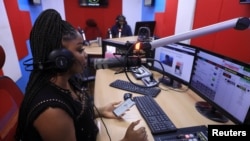Broadcasters from more than 45 African countries, meeting this week in the Cameroonian capital of Yaounde, said radio reigns supreme over all other mass media on the continent, including TV, internet, newspapers, and social and digital media.
No more than 600 million of the continent's more than 1.3 billion people have access to the internet, African broadcasters said, and even when they do, connectivity is either slow or too expensive for a majority of the continent's poor, hungry civilians.
Radio, however, remains a reliable and cheap medium for getting vital information.
John Omo, secretary-general of the African Telecommunications Union, or ATU, took part in the Yaounde meeting. He said participants at the meeting plan to inform Africa's international partners that neglecting radio broadcasting denies a majority of the continent's population an important tool for development.
"We are going to ensure that we send proposals that are meant to help Africa," Omo said. "We have several areas of our continent that are still not connected to ICTs [information and communications technology] and radio communication is really the lifeblood. Without radio, you can't transport communication to our rural population."
Omo said radio connects listeners to their community. In times of emergency and disaster, which are frequent in Africa, radio is one of the most powerful and effective ways of delivering early warnings.
The broadcasters said 2023 online penetration in Africa is between 30% and 43%, which is below the global average of about 70%.
The broadcasters said they will identify close to 20,000 frequencies that can be used for FM broadcasting in Africa without harmful interference.
The ATU said that the number of people who trust and rely on radio information is increasing as population increases. It gave no further details, but added the increase means there is pressure on the available radio frequencies, and especially on FM radio broadcasting.
Rene Emmanuel Sadi, Cameroon's communications minister and government spokesperson, said radio remains the most trustworthy medium for Africans, and African governments would not want to deprive citizens of that means of communication.
Sadi said Africa should speak with one voice during the World Radiocommunication Conference in Dubai, set for November 20 to December 15, 2023.
World Radiocommunication Conferences are held every three to four years. Participants review and revise radio regulations determined by international treaty governing the use of the radio frequency spectrum and the geostationary satellite and non-geostationary satellite orbits. Revisions are made on the basis of an agenda determined by the International Telecommunication Union Council.
